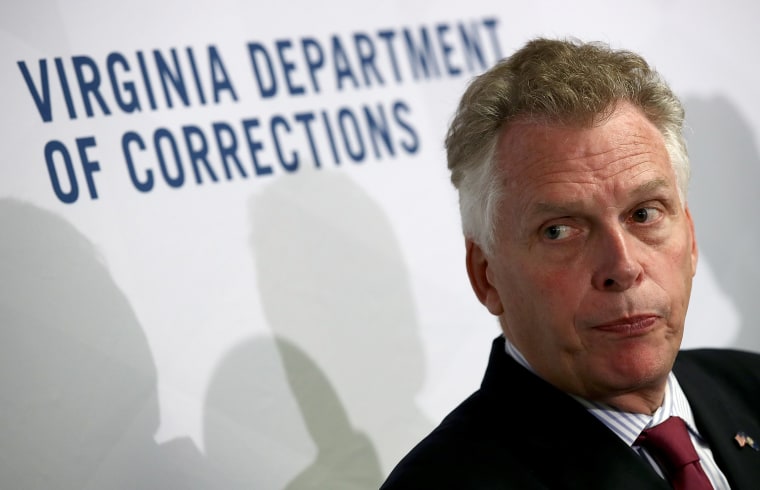The fate of voting rights for more than 200,000 former felons in Virginia has swung to and fro like a pendulum recently. An April executive order by Gov. Terry McAuliffe restored rights for ex-felons who had completed their sentences and any parole or probation. After Republican lawmakers sued, the state Supreme Court reversed the order Friday, finding that McAuliffe lacked the authority to restore rights on a blanket basis. But hours later, McAuliffe announced that he’d instead restore rights on an individual basis for all 206,000 Virginians eligible, a path the court left open to him.
A win for voting rights, then? Not entirely. Thanks to confusion and uncertainty caused by the back and forth, not to mention the lengthy timeline likely required for restoring rights individually, it’s far from clear just how many former felons will end up registering to vote by the fall. That means the political impact of the move — which Republicans have slammed as a bid by McAuliffe to help his ally Hillary Clinton this November in a crucial swing state — may end up being limited.
Related: Texas Voter ID Ruling Offers Stinging Rebuke to Law's Backers
Friday's Supreme Court ruling was the second recent setback for the campaign against laws barring ex-felons from voting, which disenfranchise nearly 6 million Americans, disproportionately racial minorities. Last month, Iowa’s Supreme Court rejected a lawsuit aimed at weakening that state’s felon voting ban. But there has been progress in other states, including Maryland and Kentucky.
In Virginia, perhaps the most pressing question is what happens to the nearly 13,000 former felons who have registered to vote since the governor's April 22 order? The court ordered the Department of Elections to cancel those registrations.
McAuliffe said in a statement Friday that he would “expeditiously” sign individual rights restoration orders for all those people. Still, they’ll need to re-register, just months after having done so the first time.
“Let me tell you this,” McAuliffe added at a Monday breakfast for Virginia delegates participating in the Democratic National Convention in Philadelphia. “By the end of this week I will have restored the rights of all 13,000.”
Local election officials, who are responsible for making sure voter rolls are accurate, say they’re still waiting for instructions from the state on how the removal process should work.
Related: Federal Court Finds Texas Voter ID Law Violates Voting Rights Act
“Should we cancel these people, or will the Department of Elections do it?” asked Lawrence Haake, the registrar for Chesterfield County.
Kirk Showalter, the registrar for the city of Richmond, said she’s still checking with the state to make sure 1,200 ex-felons who registered in response to the governor’s order were indeed eligible.
“A lot of people are going to be in limbo until the governor tells us how he intends to move forward,” Showalter said.
Then there’s the far larger number of remaining people who are eligible for rights restoration. McAuliffe added that he would continue to sign individual orders until he’d restored rights for all 200,000. But asked how long that will take, a spokeswoman declined to answer, saying more details would be forthcoming.
All this presents a serious communications challenge, say groups working to register ex-felons.
Tram Nguyen, the co-executive director of Virginia New Majority, said many people whose rights are at issue hadn’t even heard about the court ruling, much less McAuliffe’s pledge to restore rights individually. One such man, a disabled 65-year-old, came into her organization’s offices over the weekend looking to register — only to be told he’s no longer able to, though he might be soon.
Related: Virginia Republicans to Challenge Restoration of Felon Voting Rights
“I’ve gotten a lot of calls over the weekend from people who were devastated,” Nguyen added. “'What does this mean for me now? Have I lost my rights? Have they taken them away again?’”
Adding to the urgency is Virginia’s status as among the most pivotal states in the presidential election. When McAuliffe issued his order in April, with community groups poised to launch registration drives, the prospect of more than 200,000 new potential voters, disproportionately African-Americans, appeared to offer a boost to Clinton, a long-time close McAuliffe ally. In 2014, Sen. Mark Warner, a Democrat, won his reelection race over Republican Ed Gillespie by just 18,000 votes. But thanks to the setback imposed by the court, the task now appears more complicated, and the total number of former felons who make it to the polls figures to be only a small fraction of that.
That could make the situation in Virginia comparable to that in Wisconsin and Texas — a sort of partial victory for voting rights that still may keep voters from the polls. Both of those states passed strict voter ID laws, which now appear likely to be softened by the courts. But the confusion and misinformation around the issue is likely to end up deterring some voters anyway.
So it may go for Virginia’s former felons.
“Ultimately, we don’t know how many people will be affected, and how many people are going to be able to register to vote,” Nguyen said.
